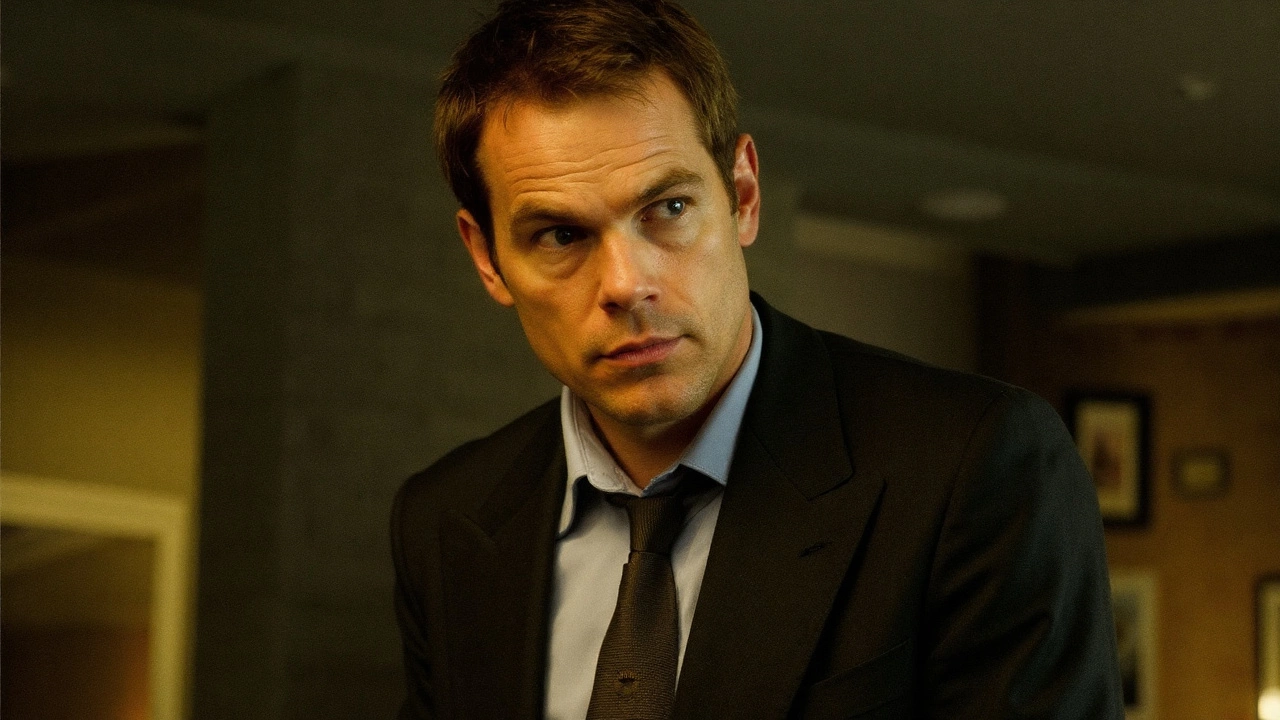Dexter: Resurrection Shocks Fans as Angel Batista Dies After 19 Years

Nineteen years after his first case file crossed our screens, Angel Batista is gone. In episode 9 of Dexter: Resurrection, titled “Touched by an Ángel,” David Zayas’s character meets a brutal end after finally getting what he chased all season: proof that Dexter Morgan is the Bay Harbor Butcher.
The hour opens with Batista doing what he has done since the beginning—watching, tracking, and refusing to let go of the truth. He tails Dexter to a restaurant and clocks a meeting with Leon Prater, a name that’s hovered on the edges of the season’s darker dealings. That sighting sets off the dominoes. By mid-episode, the NYPD pulls his badge and forces him out of New York. Batista, stripped of authority and patience, keeps going anyway.
What follows is the confrontation fans expected, but not the outcome many imagined. With his theory finally confirmed and the years of doubt lifted, Batista doesn’t hand it to a grand jury. He lunges. Rage takes over. He tries to strangle Dexter—the former colleague he once defended, the friend he couldn’t quite figure out. Then Leon Prater steps in, fires, and Batista drops. Charley flees with Prater. Dexter survives. Angel does not.
Batista’s last words—“Fuck you, Dexter Morgan”—land like a brick. It’s not closure. It’s not forgiveness. It’s the sound of a man who has carried dead colleagues in his head for decades, who finally sees the truth and refuses to soften it. Dexter’s guttural scream afterward tells you everything else: even for him, this is a new kind of wound.
A 19-Year Arc Ends With A Bullet
Angel Batista has been the series’ quiet conscience since the early days. The Hawaiian shirts, the late-night desk lamps, the steady optimism—he was the guy who believed the job meant something even when it ate people alive. He rose through Miami Metro’s ranks, from homicide to lieutenant to captain, and he paid a price along the way. Failed marriages. A short, complicated marriage to Maria LaGuerta. A front-row seat to the worst the city could throw at him.
He was also there for the Bay Harbor Butcher case, the wildfire investigation that consumed Miami. Back then, James Doakes took the fall, killed in an explosion that sidestepped the real culprit. LaGuerta never let it go. She got close—too close. She died for it, shot after cornering the truth. Batista bore those losses like stones in his pocket. He kept walking.
When he appeared in Dexter: New Blood years later, it wasn’t a wink to fans. It was a signal. Batista had connected dots that others didn’t even see. He knew the Bay Harbor Butcher story wasn’t over. He suspected Dexter was not only alive but still tethered to that old pattern of blood and tidy answers.
So when he showed up as a full-fledged series regular here, it mattered. He wasn’t nostalgia. He was the institutional memory of the franchise. The man who knew the names, the evidence, the mistakes. He came in with a mission: clear Doakes’s name, honor LaGuerta’s work, and put the right name on the case file at last.
Episode 9 shows how that mission hardened him. This wasn’t the fatherly Batista from a decade ago. Losing his badge in New York snapped the last safety line. He kept pushing because he had nothing left to lose, and because that’s who he has always been. Duty-first, even if it ruins him. It did.
The staging of his death underlines the point. There’s no grand speech. No courtroom triumph. Just a raw, ugly scuffle that exposes the thin line between justice and vengeance. Batista crosses it. Leon Prater pulls the trigger. The character we counted on to keep the show honest ends up as another body in Dexter’s long shadow.
David Zayas delivers the kind of performance you get once in a franchise lifetime—heavy with history, worn down by time, still burning. He played 96 episodes in the original run and popped back for New Blood; this time, he carried the season’s moral weight. The final minutes are hard to watch because Zayas makes them feel painfully real. Batista dies angry, human, and convinced he was right.

Why Batista’s Death Matters
For the story, this is a massive recalibration. Batista was the one character who combined personal history, detective instincts, and the will to say out loud what others couldn’t: Dexter Morgan is the Bay Harbor Butcher. Without him, the case loses its most credible voice. That doesn’t mean the truth disappears. It means the evidence Batista collected—contacts, notes, timelines—now becomes the next battleground. Who gets it? Who buries it?
It also puts Dexter in a pressure cooker he hasn’t faced in years. He didn’t kill Batista. He watched him bleed out. That difference matters—legally, morally, psychologically. If there’s a line Dexter claims he won’t cross, it’s killing a cop who once called him a friend. The scream suggests that line still exists, but grief has a way of bending rules. Expect that tension to show up in every choice he makes from here.
Leon Prater and Charley fleeing the scene leaves another fire burning. Why were they close enough to pull that off? What do they gain by silencing Batista—and by attempting to take out Dexter, too? The episode doesn’t hand over the answers. It implies a larger operation running in the background, the kind of network that can push the NYPD to sideline a veteran cop and then mop up the mess when he gets too close.
The title, “Touched by an Ángel,” isn’t subtle. It frames the hour as a reckoning for anyone who ever believed Dexter’s kills were tidy, necessary, even merciful. Angel, the literal Ángel, comes in as the avatar of consequence. He’s been counting bodies since the pilot. He doesn’t care about codes or justifications anymore. He wants the truth to win. He dies for it.
From a franchise perspective, the loss cuts deep. Batista was one of the last living bridges to the original series. He linked the big past arcs—Doakes, LaGuerta, the Bay Harbor Butcher—to the present without feeling like a cameo. Removing him this late in the season resets the emotional math. If the show wanted to prove no one is safe, it just did.
This death also fits a long pattern in the Dexter universe: collateral damage that trails the lead like a storm. Rita Bennett’s murder in season 4 changed Dexter’s story forever. LaGuerta’s death rewired the moral compass of everyone left standing. Debra’s fate still hums under every scene where Dexter tries to be more than what he is. Batista’s death joins that list, and because he dies after naming the truth, it hits like a verdict.
Fans wanted a prolonged cat-and-mouse between Angel and Dexter—interrogation rooms, legal chess, the slow squeeze. The show chose a different path. One explosive scene. One unfixable result. It’s a risky storytelling choice, but it leans into what has always made the franchise hard to predict. Dexter doesn’t beat you with plot twists. It blindsides you with consequences.
There’s a meta angle here, too. Bringing David Zayas back as a series regular wasn’t a nostalgia tour. It was a commitment to confronting the original show’s biggest unfinished business. The Bay Harbor Butcher case was never truly closed. Doakes’s legacy never truly got repaired. LaGuerta’s instincts were never truly validated. Batista embodied all of that. His death doesn’t end the conversation. It forces it into the open—again.
What comes next? Practically, the fallout is immediate. A cop is dead. The shooter is at large. Dexter was present. Every institution involved—local police, internal affairs, whatever shadow operation surrounds Prater—now has something to protect or expose. If Batista left any breadcrumb trail, someone is already looking for it. If he told anyone what he knew, that person just became a target.
Emotionally, the rupture is bigger than any manhunt. Angel’s final words are not just rage; they’re testimony. He saw Dexter for who he is and refused to flinch. That will echo through the rest of the season. Even if Dexter outruns the law, he can’t outrun that judgment. Not from Angel. Not from viewers who watched him walk past red flags for years.
For Zayas, it’s a memorable exit. He built Batista as the guy you trusted to turn on the lights after the blood dried. Season 1 of Resurrection gave him a grayer, harder version to play—still decent, but scorched by experience. The finale of episode 9 lets him pour all of that into one scene: relief at being right, regret at how long it took, fury at the cost. The character dies, but the performance stays.
If you zoom out, the structure of this season always pointed here. The more Batista closed in, the more the walls needed to shift to keep the mystery alive. The badge confiscation in New York was a red flag that he’d crossed into dangerous territory where laws are flexible and truths go missing. By the time he confronted Dexter, there were too many guns in the room—figuratively and literally—for anyone to leave unscathed.
One more note on tone: the show resists tidying up motives. It doesn’t tell you whether Dexter might count some victims as mercies. It doesn’t ask you to feel better because the shooter wasn’t Dexter’s hand. It insists on the mess. Batista dies still believing in a clean truth: the killer is the killer, no matter the story he tells himself. That clarity makes the scene hurt more.
And then there’s the history—the names that haunt this world. Doakes. LaGuerta. Rita. Debra. Add Angel. If the series is angling for a final statement on who Dexter really is, killing the last colleague who knew him as both friend and suspect is a brutal, effective step. It severs the past and forces the present to stand on its own.
Episode 9 ends with silence where Angel should be. No debrief. No dry humor to steady the room. Just the knowledge that the one person who kept chasing the truth long after it stopped being safe is gone. The case lives on without him. The question is who has the nerve—and the receipts—to pick it up.
That’s the strange legacy of Angel Batista. For nearly two decades, he showed up, did the work, and tried to keep the line between justice and vengeance visible. In “Touched by an Ángel,” that line disappears for a second, and the world he spent his life protecting swallows him. The character’s story is over. The consequences of his last act are just getting started.